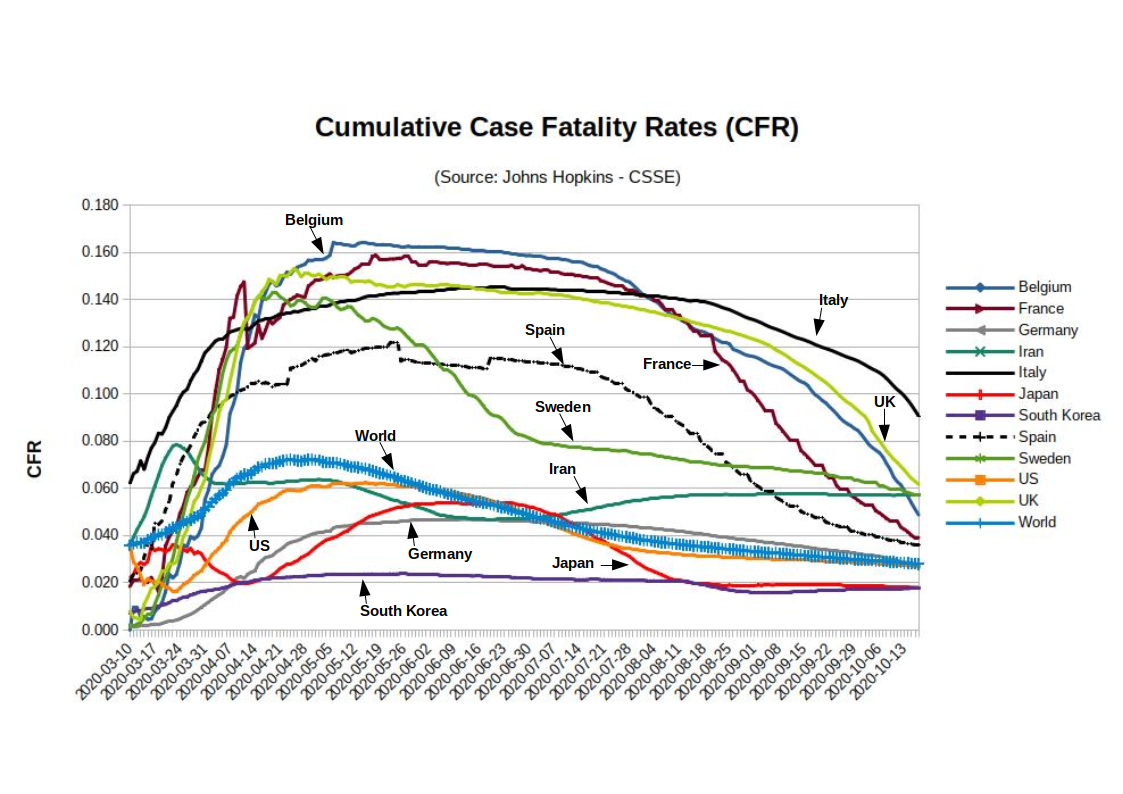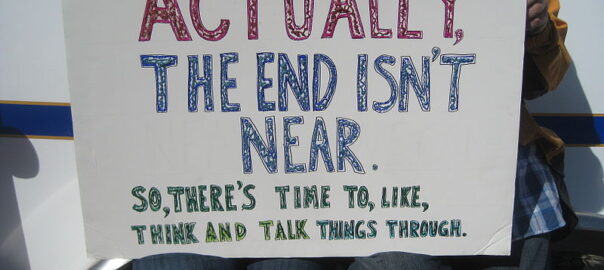[Headline photo by Photo by futureatlas.com; used under the the CCA 2.0 Generic license]
By Kent R. Kroeger (Source: NuQum.com; October 29, 2020)
“Come to terms with death. Thereafter anything is possible”— scribbled by Albert Camus in one of his notebooks.
The U.S. presidential election is essentially over. Can we stop being afraid and have a serious discussion about the coronavirus and the next steps to address it?
During this dreadful election, watching the world’s news organizations post a daily coronavirus death counts has been one of the most depressing aspects of this pandemic. And not simply because of the figure’s size — 1,176,000 people worldwide have died from this virus as of October 28th (or about 0.015 percent of the total world population)— but because the news media uses it, not just to inform us, but to force us to stew in its political ramifications. Conservative commentator Steve Deace aptly coined a term for the news media’s coronavirus coverage: panic porn. I may disagree with Deace’s contrarian view about the virus’ threat, but he’s take on the news media is spot on.
And its not just the news media failing us, its the politicians too.
“I hold Donald Trump responsible for every death in New York state from Covid, because Trump lied,” New York Governor Andrew Cuomo said in a recent conference call with reporters. “New York state had that big burst because it came from Europe and not China, and they never did a European travel ban because he was lying to the American people. He is the super-spreader that brought the virus to America.”
Never mind that Trump did impose a travel ban on European travelers entering the U.S. in early March at around the same time as other countries, or that U.S. governors have the executive authority to impose their own restrictions on international travelers into their state, blaming others is a time honored tradition among politicians. By doing so, unfortunately, politicians like Governor Cuomo and President Trump have been able to rationalize their own COVID-19 policy mistakes. And they’ve made many.
For his part, President Trump’s inability to take some responsibility for the federal government’s mistakes during the coronavirus pandemic has gravely hurt his chances at being re-elected, fair or not. The only consistent message he’s offered the American people is that he thinks China is to blame. Simply put, that political strategy hasn’t worked.
Stop the blaming!
The blame game isn’t just an intellectual cop-out, it stunts the development and implementation of real solutions as the partisan fireworks devolve mostly into substance-free, unproductive exercises in moral posturing and bad public theater.
China is not to blame for these COVID-19 deaths. And neither is Donald Trump and his administration. And neither are the Democratic governors of New York, New Jersey, Rhode Island and Connecticut whose constituents so far have experienced some of the world’s worst coronavirus death counts per capita. [Though, it was probably a mistake early in the pandemic bythose governors to systematically move thousands of elderly COVID-19 patients from hospitals to nursing homes in an attempt to keep more hospital beds available. It was a policy disaster that will hopefully get more investigation once the elections are over.]
The reality is…the coronavirus has caused the COVID-19 deaths, which is not to say our medical experts, politicians, and inadequate health care system didn’t make some grave mistakes along the way — particularly early on— as they tried to limit its spread and lethality.
President Trump’s unfounded, dreamy optimism about how quickly the pandemic would end is no worse than the Democratic Party’s ignoring their own mistakes and, instead, opting for excessive moralizing and hyperbolic doomsday predictions.
The Spanish Flu of 1918–20 killed 50 million people (675,000 in the U.S.), which was about 2.7 percent of the world’s population. The Roaring Twenties followed closely on the heals of what had been one of the worst worldwide pandemics since the 1300’s bubonic plague.
There is little doubt that — regardless of who wins the upcoming election — the U.S. and world economies will recover from this pandemic.
There has been good news regarding the coronavirus
Despite the current third wave of the coronavirus — which may exceed the other two in numbers of new cases —case fatality rates (see Figure 1 below) continue to fall or are stable in most countries (Iran being one tragic exception) and the prospects for a safe, effective vaccine by early next year have cautiously improved.
Figure 1: COVID-19 Cumulative Case Fatality Rates for Selected Countries

Whether this drop in CFRs is a function of improved COVID-19 treatments, more testing, more healthy people catching the virus, a less lethal form of the virus or some combination of these and other causes, it is likely that getting COVID-19 today is less dangerous than it was just three or four months ago.
And there will be a vaccine in the foreseeable future — whether people are willing or able to get the vaccine will be the big questions.
In the meantime, we should rejoice at the good news when we get it, even as we continue to exercise extreme prudence in protecting ourselves and loved ones from the coronavirus.
Writing in the New York Times, science writer John M. Barry, author of “The Great Influenza: The Story of the Deadliest Pandemic in History” echoed what many epidemiologists have been saying from the beginning on how to minimize the spread of the coronavirus while still allowing the world economy to be maintained at some level of normalcy:
To stop this virus without more general lockdowns, we need “social distancing, avoiding crowds, wearing masks, washing hands and a robust contact tracing system, with support for those who are asked to self-quarantine and for selected closures when and where necessary.”
In my opinion, if partisan politics hadn’t entered the public discussions at the pandemic’s outset, this excellent advice might have become habit for the vast majority of Americans much sooner. Instead, highly partisan Americans reflexively dove behind the stone walls of their respective political groups at the first sound of partisan sniping.
For that failure, I blame the news media and both American political parties. [And there I go, blaming people. What a hypocrite I am.]
- K.R.K.
Send comments to: nuqum@protonmail.com
